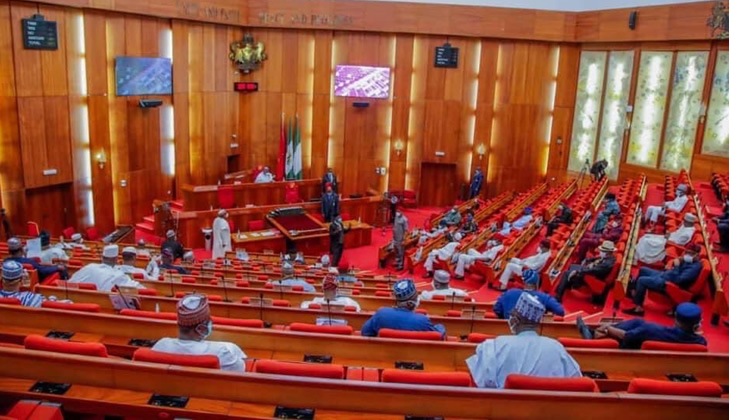Last week, the Senate Ad-hoc Committee on the review of the 1999 Constitution was said to have formally commenced the process of further altering the 1999 Constitution, as already much amended.
It requested the general public, executive and judicial bodies, civil society organizations, professional bodies and other interest groups to submit memoranda for further alterations of the constitution on some listed matters or “any other matter that will promote good governance and welfare of all persons in our country.”
Northern elders reject N1bn constitution review
Senate begins constitution review after Sallah – Sen Omo-Agege
The committee’s notice, signed by its chairman, Deputy Senate President Ovie Omo-Agege listed the matters as Gender Equality, Federal Structure and Power Devolution, Local Government and Local Government Autonomy, Public Revenue, Fiscal Federation and Revenue Allocation.
Other areas it listed were Nigerian Police and Nigerian Security Architecture, Judicial Reforms, Electoral Reforms, Socio-economic and cultural rights, Strengthening the Independence of oversight institutions, Residency and Indigeneship, Immunity, National Assembly and State Creation.
All these matters were merely contrived in order to dress up an exercise that is in fact a jamboree.
Back in February this year, Senate set up a 56-member committee to undertake this review of the Constitution.
That’s more than half of all senators in one committee!
The House of Representatives is also expected to set up a similar, very large committee to undertake the same unnecessary task.
So-called constitution review has become a wasteful ritual with our National Assembly.
Every one of its Assemblies since 1999 set up a similar committee.
Billions of naira were allocated to these committees.
In December 2015, an online newspaper reported that the Constitution Review committees of both chambers spent N7.5 billion between 2011 and 2015 in a work that produced nothing of substance.
Constitutions are not supposed to be amended according to a regular time table.
A Constitution is a supreme legal document that is supposed to last at least a generation.
Nor should constitution review be a fishing expedition, in which a committee goes about looking for areas to amend.
The American Constitution, which went into effect 231 years ago, has been amended only 27 times since then.
Ten of those amendments were done once, the Bill of Rights.
The last time a US constitutional amendment was ratified was 28 years ago.
Most of this country’s teething problems are not constitutional.
The way our leaders do things, changes to the constitution are very unlikely to improve governance.
Is it the constitution, for example, that is responsible for corruption, income disparities, wasteful projects, poor economic management, insecurity, lack of democracy in local governments, lapdog nature of state Houses of Assembly,ineffectual Auditor Generals, election malpractice and many other woes of Nigerian public life?
No doubt, problems arise in the life of a country and it becomes clear to all that some aspects of the constitution need to be amended in order to tackle them.
When such issues arise, an amendment process can be initiated at any stage.
For it to be successful, it is necessary to first of all achieve a consensus among the National Assembly, Presidency, state assemblies and state governors.
Anyone of them can torpedo a constitutional amendment item, as we saw years ago when governors, who have no formal role in the amendment process, prevailed on state assemblies to reject an amendment to vest themselves with financial autonomy.
We agree with the Northern Elders Forum’s[NEF]position that this process is a waste of time and resources and that it makes little or no meaningful impact on the lives of Nigerians.
NEF’s Director of Publicity, Hakeem Baba-Ahmed, instead urged the National Assembly to convince President Muhammadu Buhari to end insurgency and banditry as a much bigger national priority.
His observation is also apt that constitution review is not a priority “at this difficult time when the economy is facing unprecedented challenges.”
We urge that National Assembly to scrap this committee and to abandon the tradition of initiating unnecessary constitutional amendments every four years.

 Join Daily Trust WhatsApp Community For Quick Access To News and Happenings Around You.
Join Daily Trust WhatsApp Community For Quick Access To News and Happenings Around You.


